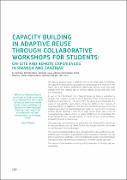| dc.contributor.author | Ahimbisibwe, Achilles | |
| dc.contributor.author | Louw, Michael | |
| dc.contributor.author | Michieletto, Manlio | |
| dc.contributor.author | Olweny, Mark R. O. | |
| dc.contributor.author | Papanicolaou, Stella | |
| dc.contributor.author | Lans, Berend van der | |
| dc.date.accessioned | 2021-08-25T10:10:31Z | |
| dc.date.available | 2021-08-25T10:10:31Z | |
| dc.date.issued | 2021 | |
| dc.identifier.citation | Ahimbisibwe, A., Louw, M., Michieletto, M., Olweny, M.R.O., Papanicolaou, S., and Lans, B.V.D., 2021. ‘Capacity Building In Adaptive Reuse Through Collaborative Workshops For Students: On-Site and Remote Experiences In Rwanda And Zanzibar’ in European Commission, Culture and Creativity for the Future of Cities: Theory, Practices and Methodologies from African, Asian and Latin American Countries. Luxembourg: Publications Office of the European Union, pp. 130 - 137 | en_US |
| dc.identifier.isbn | 978-92-76-35921-0 | |
| dc.identifier.uri | http://hdl.handle.net/20.500.12280/2834 | |
| dc.description.abstract | The idea of ‘adaptive reuse’ is relatively new in the African built environment. The value of working with existing under-utilised buildings as a resource for the future lies in the inherent potential for addressing sensitive issues that often originate from their colonial past or previous regimes during which they were built or occupied.
As part of the International Forum Cultural Spaces for Kigali, a workshop for students was hosted at the University of Rwanda’s School of Architecture and Built Environment from 10 - 14 March 2019. The participants included the University of Rwanda (UR), Uganda Martyrs University (UMU) and the University of Cape Town (UCT). The objective of the workshop and the Forum was to test the adaptive potential of unused buildings near Kigali’s city centre, and to evaluate whether disused buildings – such as the Kigali Central Prison (also known as Nyarugenge Prison, Gikondo Prison, or simply “1930”) and the Ecole Belge (the former Belgian School) – could be adapted for use as precincts for the production and performance of art and culture.
The project was launched and run by the Rwanda Arts Initiative (RAI), with African Architecture Matters and the Centre for Fine Arts Brussels (BOZAR), and funded by the Fédération Wallonie-Bruxelles.
The workshop targeted students, who, navigating their cultural differences, presented a variety of options or possibilities using visualisation methods. This was done in cooperative workshops, with presentations by students and professionals from across Africa, developing an independent, continent-specific approach.
The success of the Rwandan workshop, and its reiteration in Zanzibar, are presented here. | en_US |
| dc.language.iso | en | en_US |
| dc.publisher | European Union | en_US |
| dc.subject | Capacity Building | en_US |
| dc.subject | Adaptive Reuse | en_US |
| dc.subject | Culture and Creativity | en_US |
| dc.subject | Future Cities | en_US |
| dc.subject | Rwanda | en_US |
| dc.subject | Zanzibar | en_US |
| dc.title | Capacity building in adaptive reuse through collaborative workshops for students: on-site and remote experiences in Rwanda and Zanzibar | en_US |
| dc.type | Book chapter | en_US |


